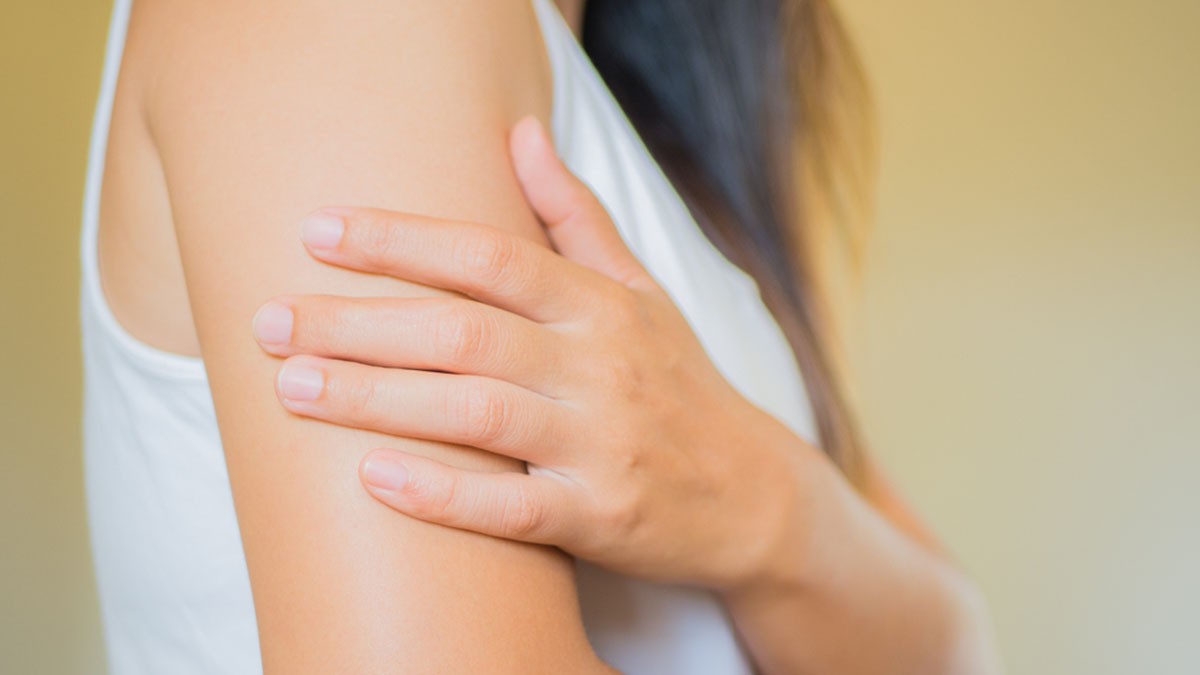Atopic dermatitis
Atopic eczema (atopic dermatitis) is the most common form of eczema, a condition that causes the skin to become itchy, dry and cracked.
Atopic eczema is more common in children, often developing before their first birthday. But it may also develop for the first time in adults.
It's usually a long-term (chronic) condition, although it can improve significantly, or even clear completely, in some children as they get older.
Symptoms of atopic eczema
Atopic eczema causes the skin to become itchy, dry, cracked and sore.
Some people only have small patches of dry skin, but others may experience widespread inflamed skin all over the body.
Inflamed skin can become red on lighter skin, and darker brown, purple or grey on darker skin. This can also be more difficult to see on darker skin.
Although atopic eczema can affect any part of the body, it most often affects the hands, insides of the elbows, backs of the knees and the face and scalp in children. People with atopic eczema usually have periods when symptoms are less noticeable, as well as periods when symptoms become more severe (flare-ups).
See a GP if you have symptoms of atopic eczema. They'll usually be able to diagnose atopic eczema by looking at your skin and asking questions.
The exact cause of atopic eczema is unknown, but it's clear it is not down to one single thing.
Atopic eczema often occurs in people who get allergies. "Atopic" means sensitivity to allergens.
It can run in families, and often develops alongside other conditions, such as asthma and hay fever.
The symptoms of atopic eczema often have certain triggers, such as soaps, detergents, stress and the weather.
Sometimes food allergies can play a part, especially in young children with severe eczema.
You may be asked to keep a food diary to try to determine whether a specific food makes your symptoms worse.
Allergy tests are not usually needed, although they're sometimes helpful in identifying whether a food allergy may be triggering symptoms.
Treating atopic eczema
Treatment for atopic eczema can help to relieve the symptoms and many cases improve over time. Consult your doctor if the condition doesn't resolve in few days. Natural remedies include:
https://www.nhs.uk/conditions/atopic-eczema/
Atopic eczema is more common in children, often developing before their first birthday. But it may also develop for the first time in adults.
It's usually a long-term (chronic) condition, although it can improve significantly, or even clear completely, in some children as they get older.
Symptoms of atopic eczema
Atopic eczema causes the skin to become itchy, dry, cracked and sore.
Some people only have small patches of dry skin, but others may experience widespread inflamed skin all over the body.
Inflamed skin can become red on lighter skin, and darker brown, purple or grey on darker skin. This can also be more difficult to see on darker skin.
Although atopic eczema can affect any part of the body, it most often affects the hands, insides of the elbows, backs of the knees and the face and scalp in children. People with atopic eczema usually have periods when symptoms are less noticeable, as well as periods when symptoms become more severe (flare-ups).
See a GP if you have symptoms of atopic eczema. They'll usually be able to diagnose atopic eczema by looking at your skin and asking questions.
The exact cause of atopic eczema is unknown, but it's clear it is not down to one single thing.
Atopic eczema often occurs in people who get allergies. "Atopic" means sensitivity to allergens.
It can run in families, and often develops alongside other conditions, such as asthma and hay fever.
The symptoms of atopic eczema often have certain triggers, such as soaps, detergents, stress and the weather.
Sometimes food allergies can play a part, especially in young children with severe eczema.
You may be asked to keep a food diary to try to determine whether a specific food makes your symptoms worse.
Allergy tests are not usually needed, although they're sometimes helpful in identifying whether a food allergy may be triggering symptoms.
Treating atopic eczema
Treatment for atopic eczema can help to relieve the symptoms and many cases improve over time. Consult your doctor if the condition doesn't resolve in few days. Natural remedies include:
- Aloe vera gel,
- garlic and turmeric to boost your immune system,
- Apply a gentle moisturizer frequently to the affected areas,
- Wrap up in cold weather as winds can dry out skin and cause eczema flares,
- Avoid strong heat sources,
- Gentle soaps and detergents,
- Avoid junk food and anti-nutrients like sugar, alcohol, tobacco.
- Use Honey; it is a natural antibacterial and anti-inflammatory agent, and people have used it to heal wounds for centuries.
https://www.nhs.uk/conditions/atopic-eczema/

